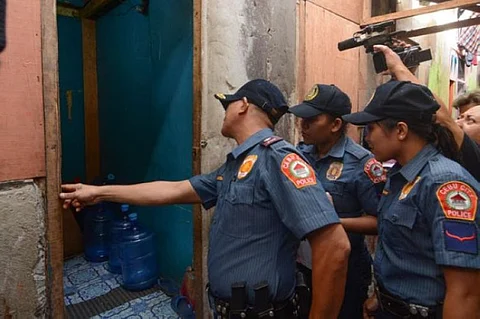

PHILIPPINE National Police (PNP) Chief Oscar Albayalde said on Monday, April 29, that he directed two police officials to “get in touch” with the proponents of a study on the government's anti-drug campaign to discuss how its implementation could be improved.
PNP Director for Operations Ma. O Aplasca and Police Community Relations Group Director Benigno Durana Jr. were tasked to coordinate with the Ateneo Human Rights Center (AHRC) to find ways how they can improve the campaign.
“I welcome the release of findings and conclusions of a study made by the Ateneo Policy Center on the PNP anti–drug campaign, particularly on the left hand approach that encourages drug offenders to submit themselves to voluntary rehabilitation and reform,” Albayalde said in a press conference in Camp Crame.
“As we have said, we are willing to listen and engage all sectors, including the academe, that are concerned and willing to assist the PNP in the fight against illegal drugs,” he added.
Albayalde said the PNP was not tapped to engage while the study is being conducted.
"Sila-sila lang on the presentation, parang audience lang kami, and kung ano i-present, kung ano gusto nila i-take na lang namin, tanggapin na lang namin. Parang one-way siya,” he said.
(It seems they just want us to take and accept whatever it is that they present. It seems one-way.)
Albayalde said the academe might be able to provide the PNP with ideas and subversive information on how they can improve their war on drugs particularly the “Oplan Tokhang” which the study said has incurred “multiple violations” of human rights.
“What we are open here is they might have something here that we do not know. We are open for suggestions even before palagi nating sinasabi we have no monopoly of intelligence here, we have no monopoly of strategy here,” he said.
“The PNP is always open for any suggestions that will improve on our law enforcement.‘Yung aming pagtataas ng standard namin and how we enforce the law. Malay natin meron silang bright idea, remember they are in the academe. It's parang a belief or stereotype na kapag ikaw ay nasa academe at nagtuturo ay matalino ka hindi ba?” he added.
(Who knows? The academe might have a bright idea. Remember, they are in the academe. If you are in the academe, aren't you supposed to be intelligent?)
Oplan Tokhang is the PNP’s campaign wherein police officers and local government officials visit suspected drug personalities at their homes and encourage them to surrender and participate in the government’s rehabilitation program.
Aside from “patterned human rights violation,” the Ateneo study also found that the conduct of the Oplan Tokhang has room for potential police excesses because of its implementing circular's "vagueness and lack of accompanying guidelines."
Albayalde said it was one of the reasons why they wanted a dialogue with the academe.
“That is the very reason we want their comments. Kung meron silang napansin na hindi namin napansin. Baka meron kaming namiss look dito. This is the very reason sabi ko nga baka meron pa silang maidagdag doon sa ginagawa namin internal cleansing program,” he said.
(They might have noticed something that we missed. This is the reason why I said the academe might have some inputs on our internal cleansing program.)
On the “unconstitutionality” of the Oplan Tokhang according to the AHRC, Albayalde said only the Supreme Court can tell.
He insisted that the Oplan Tokhang is “voluntary in nature” and that no one died during its conduct.
“Unfortunate situations like these obscured the well-meaning intentions to Tokhang and associated it with violation of certain rights. And this is how the negative 'labeling' of Tokhang started, more so, the bloated figure of 7,000 deaths attributed to it by the Ateneo study,” said Albayalde.
“Tokhang is only a strategy which is an innovative approach where previous strategies failed. We understand that it is easier to criticize. We welcome suggestions and even constructive criticism, but only if these can offer a solution,” he added. (SunStar Philippines)